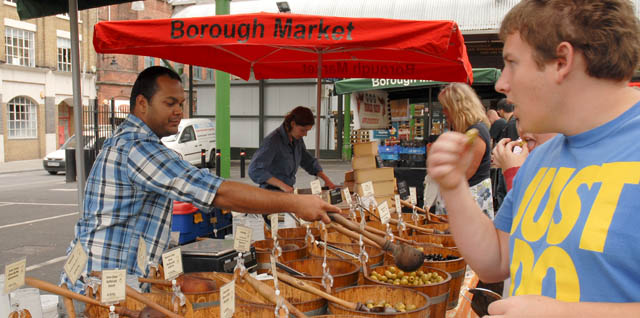(单词翻译:单击)

Do you know your plates of meat from yourporkies? How about your trouble and strife from your tea leaf? Unless you’re anEnglish native, you may be wondering what on earth all this means.
你知道plates of meat、porkies、trouble and strife、tea leaf在英文中都代表着什么意思吗?除非你的母语是英语,否则你可能根本搞不清楚这些到底是什么意思。
These words, which may sound nonsense, areknown as *cockney *rhyming slang, a system of speech used across the UK.
这些听起来十分“无厘头”的词,其实是一种在英国被广泛使用、来自伦敦的押韵俚语。
Rhyming slang has roots in 19th centuryeast London, and developed either as a method for market stall traders tocommunicate in secret or perhaps even a way for thieves to trade informationwithout giving away their game – historians are unclear of its true origin.
押韵俚语起源于19世纪的伦敦东区,可能是一种小商贩之间沟通的密语或小偷间交换信息的暗号——事实上,就连历史学家们目前也无法界定它的真正起源。
While there’s no official listof phrases –you could even make them up as you go along - the general rule isto replace one word with a two-worded phrase that rhymes with it.
并没有哪个官方名单列举这些表达——你甚至都可以自己创造一些谚语——大体规则就是用一个押韵的双单词词组来替代单个单词。
For example: “dog and bone”(phone) and“Ruby Murray”(curry).
例如:“狗与骨头dog and bone”(电话phone)以及“露比•默里Ruby Murray”(咖喱curry)。
Fortunately, there are websites and apps tohelp if you still don’t have a Scooby Doo (clue).
幸运的是,如果你还是连一条“史酷比狗狗Scooby Doo”(线索clue)都没有的话,还可以求助一些网站和应用。
“I’d like as many Londoners as possible to have a go, let us know howthey get on and add the words we don’t know about,”DickHoweson, the creator of uTalk, a rhyming slang translation app, told Msn.com atits launch in July.
“我希望伦敦人尽可能都来试一试(这个应用),告诉大家他们如何使用押韵俚语,分享一些大家不知道的用法,”押韵谚语翻译应用uTalk的创始人迪克•豪尔森七月发布该应用时,向Msn.com 表示。
The app’s release comes justa few years after a survey conducted by the Museum of London suggested thatrhyming slang is declining in use.
该应用发布几年前,伦敦博物馆开展的一项押韵俚语调查指出,押韵俚语正在逐渐衰亡。
The museum claimed after the 2012 survey of2,000 UK residents that rhyming slang was soon to be “brown bread”(dead)after results showed that most *respondents’knowledge of it haddisappeared.
2012年,2000名英国居民参与了该调查,结果显示,大多数参与调查者并不具备押韵谚语的相关知识。因此,博物馆认为押韵俚语很快就会变成“黑面包brown bread”(“死亡dead”)。
“For many people, cockney rhyming slang is *intrinsic to the identityof London.
“对许多人而言,伦敦东区的押韵谚语是一种伦敦人身份的固有象征。
However this research suggests that thecockney dialect itself may not be enjoying the same level of popularity,”said themuseum’s curator, Alex Werner.
然而,这项调查却显示,伦敦方言自身却并非如此普及,”博物馆馆长亚历克斯•维尔纳说道。
Despite this, rhyming slang seems to beenjoying a *revival.
尽管如此,押韵俚语似乎正在悄然复兴。
Not only does it have its own apps andwebsites, “cockney”is even a language option on some ATMs in east London –perfect forlocals in need of some sausage and mash (cash).
现在它不光有了自己的应用和网站,在伦敦东区的一些ATM机上甚至出现了“伦敦方言”甚这一语言选项——对于需要“香肠和麦芽浆sausage and mash”(“现金cash”)的本地人来说,这堪称完美。
But why do people still use this form ofdialect?
但为什么人们仍在使用这种方言呢?
“It makes me smile whenever I hear people using rhyming slang and Itry to keep it in use myself,”says Ian Groves, 53.
“每当我听见人们用押韵俚语的时候,我都十分开心。 我自己也尝试着继续使用这些谚语,”现年53岁的伊恩•格罗夫斯说道。
Ian grew up in London but now lives furthersouth.
伊恩在伦敦长大,目前住在更南边的地区。
He was brought up hearing rhyming slang andsays it brings back memories of his younger days.
他听着这些押韵俚语长大,称这让他回忆起了青葱岁月。
“My parents were both Londoners and we used rhyming slang around thehouse.
“我父母都是伦敦人,所以我们总在家里说这种押韵俚语。
I’d be told to wash myGerman bands (hands) before dinner and my grandma would go up the apples andpears (stairs) at bedtime,”he says.
从小,他们就教我晚饭前要洗‘德国乐队German bands’(‘手hands’),我的祖母在睡前上‘苹果和梨apples and pears’(‘楼梯stairs’),”他说道。
“It reminds me of my youth.”
“这些俚语让我想起了整个青春。
So if you really want to show off yourEnglish skills on a trip to the UK, walking into a cafe in east London, askingfor a cup of Rosie Lee (tea) then telling the cashier to keep the rifle range(change) wouldn’t be a shabby start.
所以,如果你真的想在英国的旅途中秀一把英语,就走进东伦敦的一家咖啡馆,点一杯“罗西•李Rosie Lee “(茶tea),然后告诉收银员不用找“打靶场rifle range”(零钱change)了。这一定会是个不错的开始。


